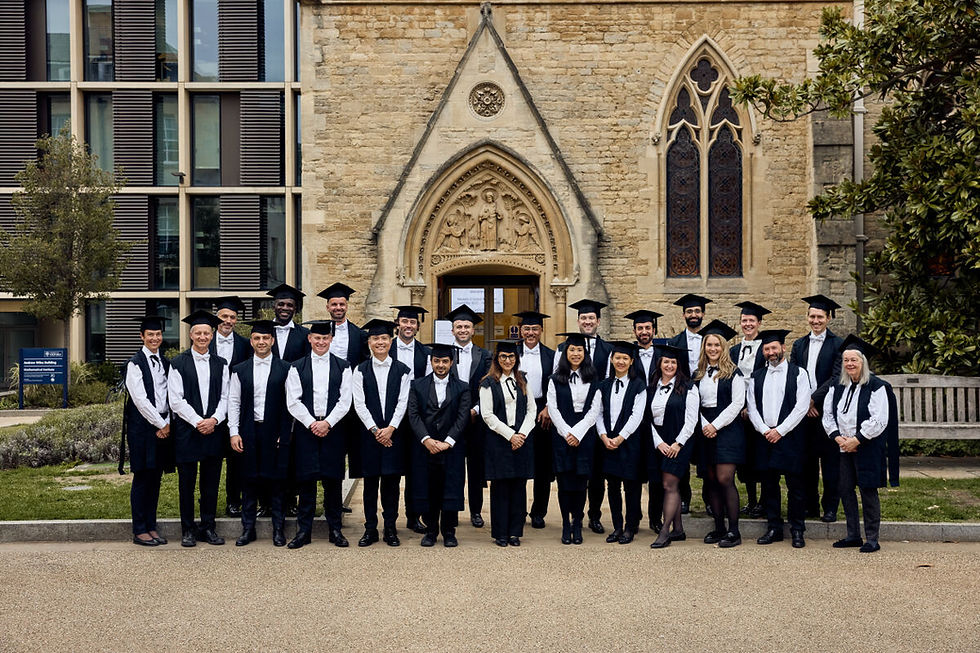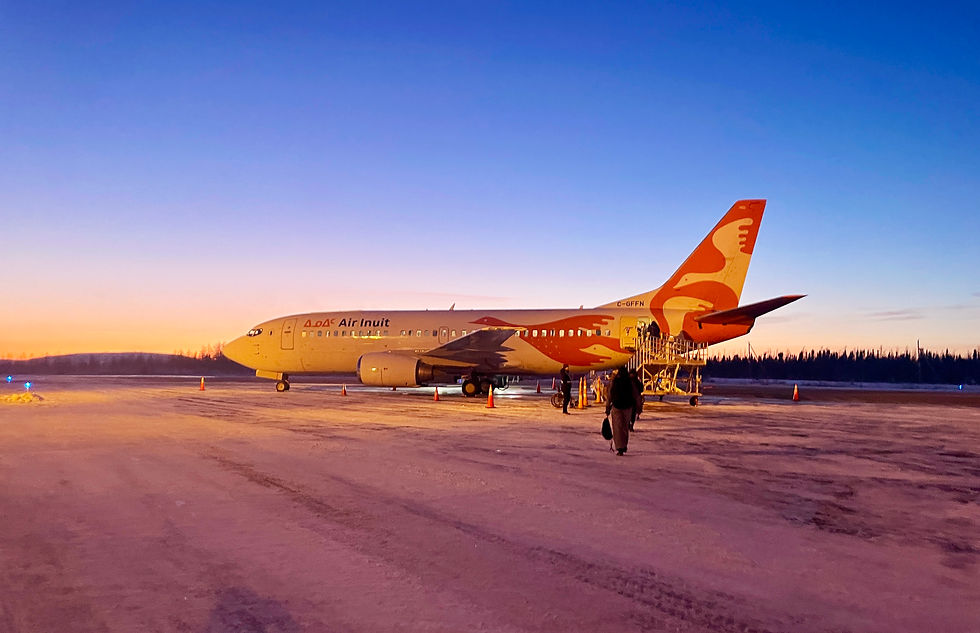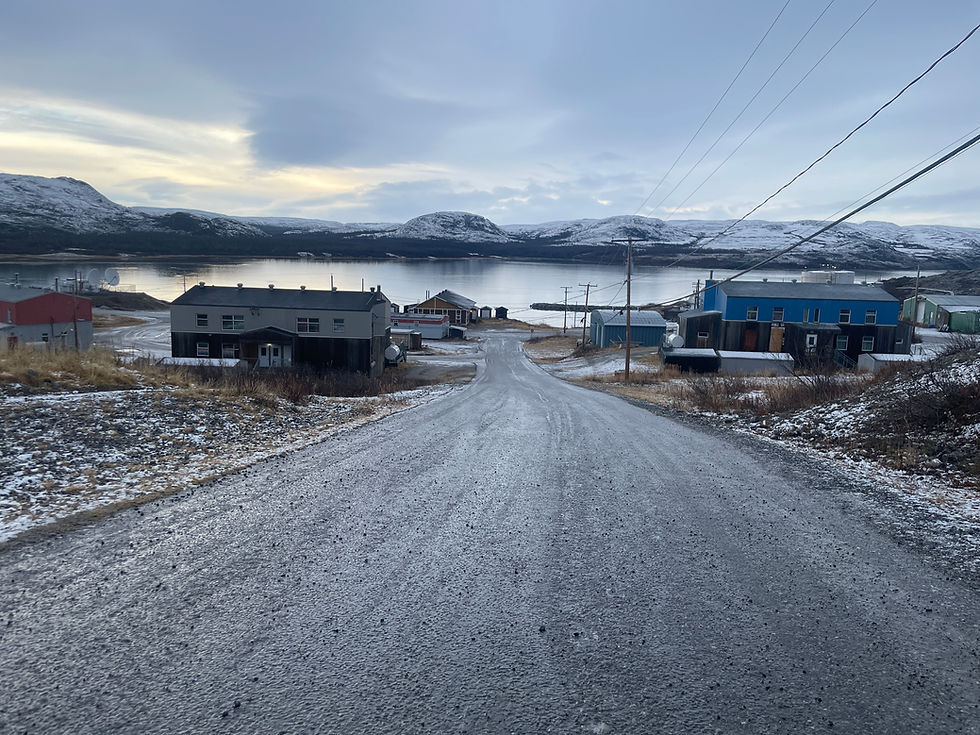Nunavik and the spirit of interconnectedness
- Michelle Kwok

- Jan 23, 2024
- 8 min read
Updated: Jan 7, 2025

This week began with me discovering a new Arctic community on my own. Alyse had departed the day before and Dr. Johanne was waiting to return. Although I initially felt nervous, I would soon find new advisors and teammates in the clinic and connect with locals who showed me the cultural richness of Kangiqsujuaq.
Jan 14, 2024
My arrival in Kangiqsujuaq the day before coincided with the only break in stormy weather. Once again, the wind picked up with what seemed to be an impending blizzard. Undeterred, I decided to take a morning walk to acquaint myself with the town that would be my home for the next few days.
The streets appeared strangely deserted, even for a Sunday morning. It was then that a local on a skidoo, armed with a rifle, approached and informed me of the situation. The community was under lockdown from 9 am to 3 pm, responding to two tragic incidents the previous week. A 4-year-old boy in Salluit and a little girl in Inukjuak were mauled to death by stray dogs.
In an effort to prevent further incidents, the town initiated a lockdown and began culling stray dogs. The interconnectedness of the communities ensured the swift spread of information. Every household received instructions to keep their dogs indoors, and any remaining strays were to be shot. The man then asked me to warn the other visitors in the hotel in case they, like me, were unaware. In many northern communities, stray dogs were a significant cause of concern. If food was scare or the dogs somehow became aggressive, there could be fatal consequences. And while culling may not be the most desirable option, it was at times necessary to protect the welfare of innocent children.
Jan 15, 2024
I felt a little nervous stepping into a new CLSC (centre local de services communautaires), where once again I knew nobody. Before long, my apprehensions melted away as I was welcomed by Dr. Pierre Olivier Kassis, the general practitioner, Marie-Ève, the head nurse, and the versatile Emmanuel, who handled a range of tasks. Working alongside them were a group of enthusiastic healthcare workers and interpreters.
As I set up my equipment in the clinic room near the entrance, a stretcher carrying a lifeless body was wheeled past my room. In that brief glimpse, I saw the peaceful face of an elderly lady who had passed away the night before. Her body was here to be officially declared deceased and transported to the morgue.
The rest of the day progressed with new consultations for food allergies, drug challenges and dermatitis. Dr. Johanne, who had navigated through multiple flight mishaps, finally arrived in the late afternoon.
Jan 16, 2024
Some of the women in the community opened up about the concerns weighing on their minds. These encompassed local tragedies such as the unfortunate incidents involving the children mauled to death and the passing of the elderly lady. Their thoughts also extended to broader international events that held significance for them. In moments of difficulty, the natural response was to stand together in solidarity, recognizing that the shared burden was not just an individual's, but the entire community's to bear.
Jan 17, 2024
Dr. P-O's first patient of the day arrived with a thoughtful gift of three freshly caught and frozen Arctic chars. He proudly unwrapped the brown paper on our clinic desk and pointed out that the sign of freshness was blood on the gills. Intrigued by the challenge of preparing the fish in its frozen state, I inquired about the process of degutting. Apparently, the method involving a hammer to pound the knife in.
In the early afternoon, a group of clinic staff, including P-O, Marie-Ève, and myself, made our way to the cemetery to pay our respects to the woman who had recently passed away. The outdoor funeral drew a crowd of over a hundred people. The attendees solemnly sang hymns, seemingly unfazed by the harsh Arctic weather. The commitment to attend was so strong that even public vehicles were utilized to transport community members to the funeral. Following the ceremony, some individuals started shoveling soil into the grave while the rest of us headed back to the tasks of the day.
In the evening, P-O arranged a spontaneous opportunity to purchase a locally carved sculpture. Although we were unsure of the artist’s exact location, we took the chance and drove to a house where we were graciously welcomed inside. There, Jobie Koneak showcased his soapstone creation and shared how he often found inspiration during his ventures into the land. Using a soapstone he found near the mine, Jobie spent several days carving the eagle using only traditional tools. Afterwards, he applied shoe polish to give its characteristic black hue then allowed it to set in the oven. Meeting the artist himself and hearing about his creative vision added a unique and personal touch to the sculpture.
We then gathered at P-O's place for dinner, where he prepared the Arctic char his patient had gifted him earlier. He also shared with some traditional foods, including raw char, beluga skin, and dried beluga meat mixed with fermented blubber. The char was exceptionally flavorful and fresh in both its raw and baked forms. Recalling the chewy and slightly oily nature of beluga skin from my first taste last year, I decided to try it this time with some spice flavouring. The dried beluga whale, a bit bloody for my tastes, was strangely made more palatable by the fermented blubber. Once again I was grateful for the opportunity to sample the traditional foods that had sustained the Arctic peoples for centuries.
Jan 18, 2024

I prepared early in the morning to check out of the hotel at 8 am, anticipating a ride from Emmanuel to the airport. However, the news of our flight cancellation due to strong winds disrupted the plans. As I had already checked out of the hotel, we swiftly relocated all my belongings to the staff transit to stay with Johanne until we could fly out. All of us returned to the clinic afterwards to do work and see patients. Despite the challenging weather conditions, quite a few did come. Their commitment made the continued stay worthwhile for me.
Jan 19, 2024
Video credit: Dr Pierre Olivier Kassis
My new routine was now to wake up, pack all my food into the cooler, wash our beddings, and have all our belongings ready for an 8 am pickup. With a little extra time on my hands, I took a short walk to the hotel at 7:15am where a passenger on the same flight warned me of a delay. Emmanuel arrived but the weather conditions were so severe that even in the brief moments he parked, the car got stuck in the snow. The journey to the airport was dangerous, with poor visibility and strong winds making navigation nearly impossible as he drove up a hill on a cliff.
After a short wait at the airport, we learned that the flight was cancelled. We were rebooked for 3 pm with the new check-in scheduled for 1:30 pm. We decided to leave our belongings at the airport and headed back to clinic. Before long, we heard that the rebooked flight was also cancelled till the next day. Determined to make the most of the unexpected stay, I scanned the "en attente allergo" list for potential patients. With the help of the interpreter, we reached them through telephone, Facebook Messenger and even by announcing their names on the FM radio. A number of patients responded, and the afternoon was productive with multiple drug challenges.
In the evening, the harsh winds finally subsided and the air became still. I stepped outside for a walk and was finally able to witness Kangiqsujuaq in all its natural beauty.
Jan 20, 2024
Today is the day we would fly! That was what I told myself in excited anticipation because the stillness of the night had lasted into the morning. Our group, including Johanne, Marie-Ève, P-O, and newfound acquaintances, headed to the airport by 9am to wait for the extra flight that was made for rebooked passengers.
We boarded at 11:35 am and made a brief stopover in Kangirsuk. As we waited in the terminal for refueling, an unexpected challenge surfaced – the airline had overbooked by one passenger. A traveler in Kangirsuk urgently needed to reach Kuujjuaq for a connecting flight to Montreal that same day. While most had connecting flights confirmed for that afternoon, mine was on Sunday. Earlier attempts to secure standby for January 20 had failed. In a moment of spontaneity, I opted to relinquish my seat and said farewell to the fellow passengers. The colleague of the man taking my place expressed immense gratitude, even sending a gift from his cultural institute.
Alone in an empty airport, the Air Inuit agent promptly arranged for an employee to drive me to the Northern store, providing lunch courtesy of the company. During this time, I realized I had left my snow pants and sealskin mitts in the plane. After attempting to contact them through the air traffic controller, I was still uncertain if they would be waiting for me on arrival. As the hours passed, my flight underwent multiple rebookings. Finally, by 6 pm, the same plane and crew that had taken the initial passengers to Kuujjuaq returned to pick us up. I felt incredibly relieved to have finally landed in Kuujjuaq and to retrieve my belongings at the counter. And before I could make a call for transport, a fellow passenger who worked for the hospital, offered me a ride.
I wasn’t sure who to expect when I unlocked the door at the transit. Would I have the place to myself, or a roommate? I entered and found a family medicine resident from Laval and a pharmacist from Kuujjuaq hospital who were cooking a stir fry. They welcomed me as if I was a guest joining them for dinner. Afterwards, I made my bed and settled in for the night. Two lingering thoughts remained: Was this to be my last night in Nunavik? And with the clear sky, would I finally witness the Northern Lights?
Jan 21, 2024
The skies were relatively clear with moderate winds, but what reassured me more was that Kuujjuaq airport had two runways and larger planes compared to those flying in other communities. I spent the morning shopping at Tivi Galleries and taking a walk around town. After I said goodbye to my temporary roommate, I wheeled my cooler and suitcase to wait at the hospital instead of calling the transport driver to pick me up at the transit. While waiting at the entrance, a familiar face recognized me and kindly offered a lift.
The process of checking in went smoothly, which was such a pleasant change compared to the hiccups of the last two weeks. Once the airplane was ready, we were called by overhead to go through airport security. Returning south was the only instance passengers would need to do this. For me, it signified a re-entry into a world vastly different from the one I was about to leave. In single file, we lined up outside the Canadian North 737-400C plane, its 13 rows making it the largest aircraft I had taken since my arrival. Pausing for a brief moment to absorb the surroundings, I turned my gaze back towards the plane and headed home.
Concluding thoughts
The central theme of this two-week journey to Nunavik was the deep interconnectedness of its communities. Witnessing the Inuit's collaborative approach to survival in the challenging Arctic environment showed me the significance of working together. And when one individual experienced loss, the reverberations were felt throughout the community, which gathered together in solidarity.
As I re-enter the world I left behind, the stark contrast between Nunavik's communal strength and the prevailing isolation in the city becomes evident. The belief in self-sufficiency and heavy reliance on technology often foster a pervasive sense of loneliness, easily overlooked in the busyness of daily life. Although inconvenient at times, it is imperative to intentionally cultivate relationships with others. Whether connecting with those who genuinely care or extending a hand to individuals seemingly distant, the process of building community bonds proves vital and relevant in any context or location.
In the spirit of this interconnectedness, I'd like to introduce Saputjiqatigit ᓴᐳᑦᔨᖃᑎᒋᑦ, an Inuktitut word which means "helping each other." Stay tuned for a future post where I'll explain more about its significance for myself and for those that have supported this journey.
































Nice, thoughtful and articulate article Michelle.